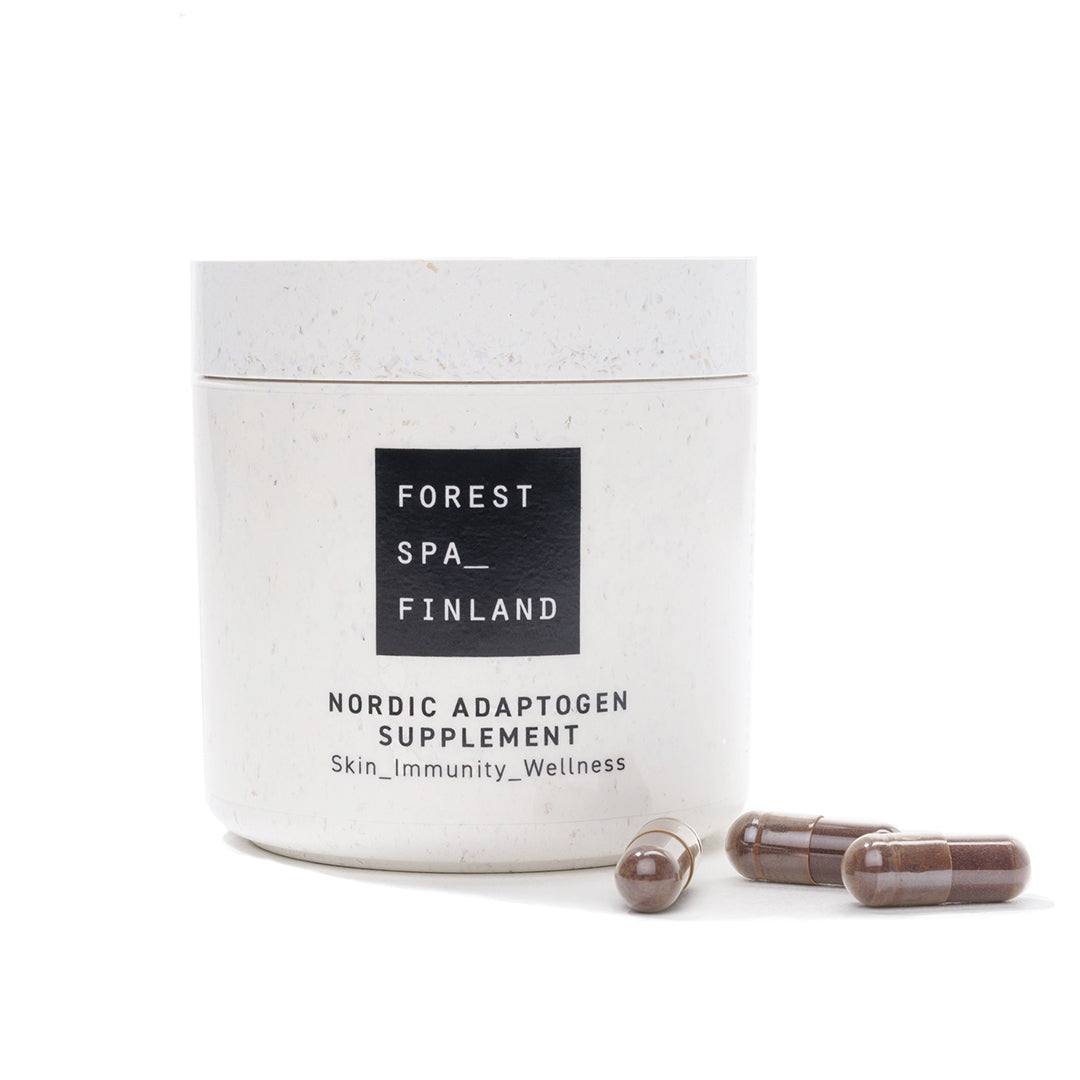Peri/menopause
+ Adaptogens
A deep-dive on all things skin, peri/menopause, adaptogens + supporting our bodies from the inside-out during times of transition

FOREST SPA FINLAND talks to
Dr Linia Patel (PhD), RD,
author of the bestsellingbook
Food for Menopause
In your opinion, how does perimenopause specifically affect the skin, and
how can we start to better support our skin from the inside, before we reach
peri/menopause?
Dry, itchy skin is a common complaint during menopause, largely due to
declining oestrogen levels. Oestrogen supports skin hydration by aiding the
production of ceramides, hyaluronic acid, and sebum.
Its loss leads to dryness,
as water evaporates more easily. Additionally, oestrogen deficiency reduces
collagen – a protein crucial for skin strength and elasticity – resulting in more
fine lines, wrinkles, and sagging. Up to 30 per cent of skin collagen may be lost
within the first five years after menopause.
Hormonal changes during menopause also increase skin sensitivity, emphasising
the importance of a nutrient-rich, well-balanced diet to support healthier, more
resilient skin through this transition.
My top tips:
Stay hydrated.
It sounds simple (and it really is!) Good hydration is not only
essential for concentration, energy levels, circulation, gut health and overall
wellbeing, but it’s also great for hydrating your hair, skin and nails!
Be sure to
drink at least 1.5-2L (51-68 fl oz) of water per day, more if it’s hot weather or
you're sweating a lot. If you find it hard to drink enough water, try herbal teas or
add slices of lemon, cucumber or berries to your water for extra flavour.
Include essential fats in your diet.
These essential fatty acids form an integral
part of the epidermis, the outer layer of the skin. Not including enough essential
fats in your diet can result in a dry skin.
Nuts are a good source of protein,
healthy fats and vitamins E & B. Walnuts and flaxseeds are great sources of
omega-3 and 6 fats as well. Grab a handful as a snack, add them to breakfasts
or salads, or enjoy a natural nut butter as a topping! Eat oily fish a minimum of
once a week.
Up your protein.
Skin, hair and nails are made mostly of proteins like keratin,
collagen and elastin, which provide strength and elasticity and support healthy
growth.
Include a quality source of protein, from fish and meat, to organic dairy,
seeds, nuts and pulses, at every meal and snack.
Antioxidant-rich foods.
Vitamin C, E and beta-carotene are antioxidants which
help to reduce free radicals and slow down skin damage and improve the skin’s
resilience. Keep your vitamin levels high by eating plenty of colourful fruit and
vegetables!
Adaptogens can play an important role in helping the body mitigate stress +
become more resilient. How can they help us during peri/menopause, and
are there any specific adaptogens you’d recommend?
Our resilience to stress decreases in the perimenopause as the hormonal flux we
are undergoing is a stress itself! So, it is fundamental that we build in
sustainable practices and rituals that help to calm down our nervous system.
This means engaging in activities that calm down the parasympathetic nervous
system such as yoga, meditation and massage. You can also support your body
with adaptogens.
Adaptogens are certain herbs or mushrooms that are thought to have multiple
health benefits. These herbs are thought to be particularly good in helping our
bodies reach to or recover from both short- and long-term physical or mental
stress. The research on adaptogens is ongoing. Although there is limited
evidence from high quality studies to back the claims of effectiveness there are
some new and promising studies beginning to emerge.
Researchers say that adaptogenic herbs interact with the hypothalamic-pituitaryadrenal
(HPA) axis which is a complex system of glands and hormones and
receptors in the human body.
The HPA axis is central to the body’s homeostasis,
stress responses and energy metabolism. Adaptogens work with the HPA axis to
help balance out these systems. If there is too much of one hormone,
adaptogens help lower it for example. On the flip side, if there isn’t enough of a
hormone, adaptogens can help to replenish its levels.
Some studies also suggest
that adaptogens interact with the immune-neuro-endocrine system which helps
the body regulate its use of energy and maintain strong immune defences.
There are many different types of adaptogens, each said to have its own specific
action. Each adaptogen has a different effect on the body so the one you take
will depend on the result you seek.
Examples of the common ones are:
| Adaptogen | Potential benefit |
|---|---|
| Ashwagandha | A general tonic. Reduces stress and anxiety. Helps with ageing. Increases testosterone levels. |
| Astraglus | Combats fatigue |
| Rhodiola rosea | Prevents physical and mental fatigue |
| Tulsi (Holy Basil) | Promotes relaxation, relieves stress and anxiety |
| Siberian Ginseng | Supports good energy levels and helps to overcome exhaustion |
| Cordyceps | A type of mushroom that helps the body adapt to stress and promotes a health sleep pattern |
| Liquorice | Increases energy, endurance and helps boost the immune system |
| Maca | Improves mood and increases energy |

Nutrition experts recommend using adaptogens for a few days or week when you
feel your body needs support. However, they also recommend rotating the type
of adaptogen you are using after six weeks so your body can benefit from the
subtle differences among the herbs.
Stimulating adaptogens such as rhodiola should be taken earlier in the day to
align with the body’s circadian rhythm. Calming adaptogens such as Holy Basil
can be taken in the evening or before bed.

Our Forest Spa Finland Nordic Adaptogen Supplement contains THREE potent + synergistic adaptogens: chaga, bilberry + rhodiola
Learn more
Before you start consuming them, remember:
They may react with other medications. If you are taking a prescribed
medication, ensure that you talk to you doctor before adding any adaptogens into
your routine. Liquorice root for example may cause elevated blood pressure.
They are better in low doses taken over short periods.
Experts recommend
ingesting adaptogenic herbs in small doses each day over the course of 6 - 12
weeks. Taking larger doses in a single setting may result in adverse effects like
nausea, vomiting, dizziness or headaches. There are few long-term studies that
have examined the safety of taking specific adaptogens over time. They work differently from person to person. Don’t take an adaptogen just
because your best friend takes one and swears by it.
Adaptogens can react
differently between individuals. So, make sure you research which one(s) could
work best for you and for best results consult a health professional on how best
to incorporate it.
What are three relatively simple things we can do, today, (these can be
lifestyle/diet/mindset) to begin better supporting our bodies as they
navigate perimenopause?
1. Know yourself!
Everybody’s journey through the perimenopause is unique
and individual. Know what your relative ‘normal’ is and when there are impactful
deviations from your normal get the support you need to ensure that you do not
suffer in silence and are able to continue to thrive through your menopause
transition.
Adopt a symptom stock-take ritual. You can begin this at any age but
prioritise it when you are in your 40s as part of your self-care is to sit down and
check in with yourself. How are you? Are there any changes? When did I notice
it? What happened today? There are lots of helpful, free symptom trackers online
you can download and use.
2. View your perimenopause through a holistic lens.
The menopause
transition can be tough and comes at a time when we are juggling other
commitments, so we get sandwiched with pressure from above and below. Ageing
parents, teenagers, empty nest, demanding career and so on.
And we know it’s a
fact that your fluctuating hormones can make it harder to cope with everyday
stress. If you don’t take care, you become less resilient. Life can feel tougher.
What matters isn’t just about how you look. It’s about how you think and feel.
When you feel your best, you deal with the world around you better and you
bounce back better when adult-ing throws you curve balls. It is not about
comparing. It’s about sharing tools to help you find what will work for you and
help you in your journey.
To fully support your menopause journey you need to
look at health through a holistic lens. With this fresh perspective often break
wellness down into the following pillars:
> Nutrition
> Sleep
> Movement
> Mental wellbeing + stress management
3. Pick one thing and do it consistently.
I have had the privilege of working
with many movers and shakers who are at the top of their game in both the
corporate and sporting world, and I can tell you one thing: successful people
thrive on daily routines.
They attribute their achievements to the power of
consistency and structure. There isn’t a single “high-performing high-energy
diet,” but high achievers excel by mastering the basics and committing to
seemingly small actions consistently. Ironically, the most effective strategies are
often the simplest ones, done consistently.
Small habits can lead to
transformative gains. Just pick one thing. Drinking more water. Eating more
vegetables. Walking more. Doing a regular symptom tracking. Going to bed at a
consistent time + getting enough sleep…. Just one thing.
Food for Menopause by Dr Linia Patel is published by Murdoch
Books, £20.00,
www.murdochbooks.co.uk
Showing making procedure is a good way to guarantee product quality
Make it easy to buy by eliminating stumbling blocks to purchase. Don’t assume customers know which item you’re talking about in your post. Provide a link directly to the product page or just link the product to your blog so they can buy if they want. If it relevant give readers more than one way to get to the product.
Recommend relevant products in this section
Include a variety of different forms of content. Photographs and videos are particularly important because readers tend to be visual and want to see your product in action.
Check out our 3 newest collections
Moisturizer

Facial Cleansing

Toner

